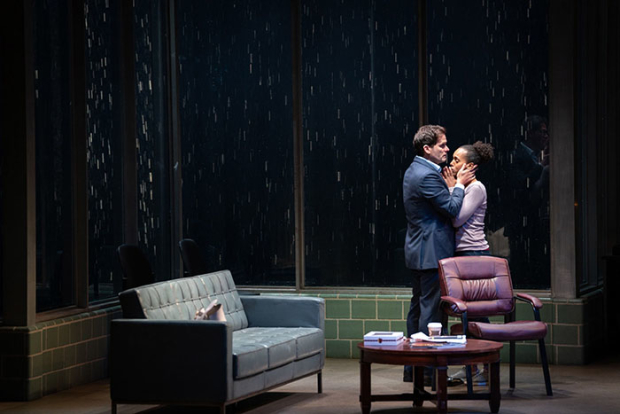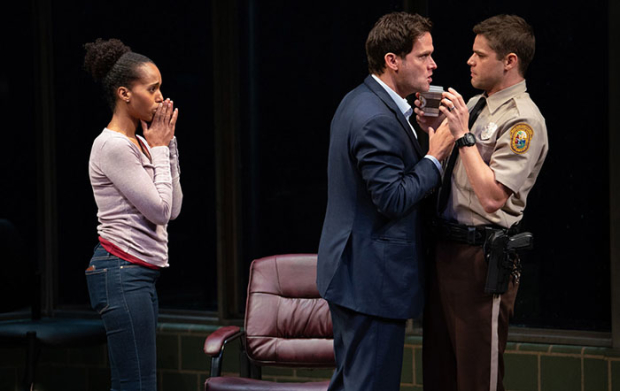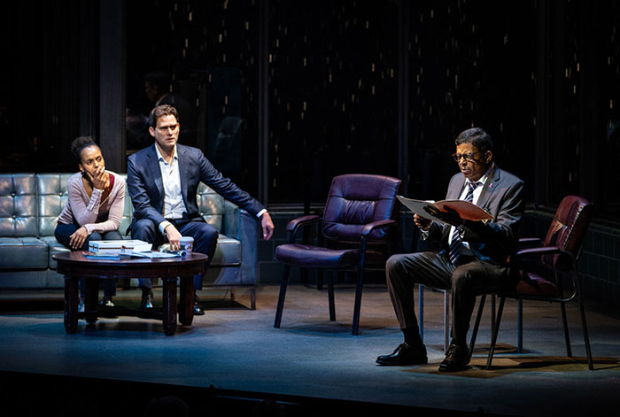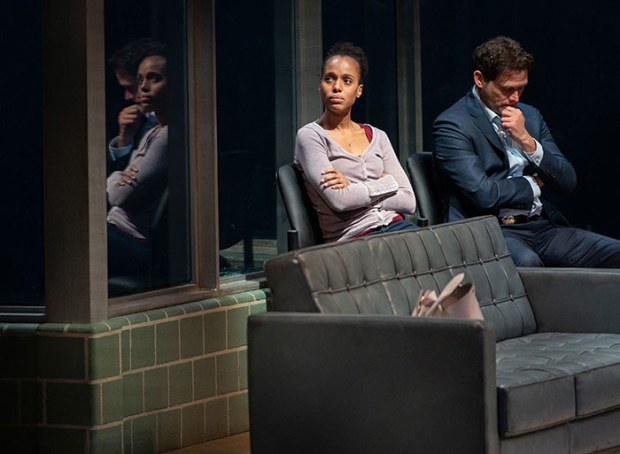American Son Is an American Tragedy Ripped From the Headlines
Kerry Washington and Steven Pasquale star in a new Broadway play by Christopher Demos-Brown.

(© Peter Cunningham)
Halfway through American Son at the Booth Theatre, a big question starts to cross your mind: Is this new drama about an interracial couple searching for their missing 18-year-old son the wokest show on Broadway? It certainly appears that way, with a ripped-from-the-headlines plot that couldn't be more relevant, from-the-gut performances by Kerry Washington and Steven Pasquale, and a staging by Kenny Leon that elicits an extremely vociferous audience response.
Evidently, surface-level theatrics can sometimes be mistaken for profundity. That's especially true of American Son, a play that says a lot and nothing simultaneously, and marks the Broadway playwriting debut of Miami-based trial attorney Christopher Demos-Brown. Set in real time, the 85-minute drama opens with Kendra (Washington), a highly educated black woman, alone in a Florida police station. Her son, Jamal, has been stopped in some kind of traffic incident and isn't answering his phone. Officer Larkin (Jeremy Jordan) isn't being very forthcoming with details. Lieutenant Stokes (Eugene Lee), the community affairs liaison who could provide much-needed information, doesn't start his shift for another few hours. It's 4am and Kendra is getting desperate.

(© Peter Cunningham)
Soon after, Scott (Pasquale), Kendra's estranged husband, arrives. A white FBI agent, Scott doesn't understand why his son — whom he affectionately calls "J" — would put himself in a position to be pulled over by police. Or why the young man, who scored in the high 1400s on the SATs and is getting ready for West Point, would start wearing his hair in cornrows. Or why the Lexus they got him would suddenly bear a bumper sticker that reads "Shoot Cops." Kendra knows the answers — and the repercussions — all too well. And that's what she's afraid of.
Dramatically, American Son is strong in its depiction of parental angst, especially with Washington beautifully capturing the all-consuming fear that comes with being mother to a black child in a country that constantly makes them a target. More often, though, Demos-Brown takes the easy way out. His plot machinations are filled with textual land mines that get loaded and detonated in predictable ways, and the red herring he employs for theatrical effect isn't actually a decoy. Leon's production puts more stock in the melodramatic elements of the script (thanks to the lighting of Peter Kaczorowski and sound of Peter Fitzgerald, it's a dark and stormy night, complete with onstage rainstorm). In a play about this subject mater, we should naturally be on the edge of our seats, instead of being manipulated to get there.

(© Peter Cunningham)
Even worse is that Demos-Brown has created archetypes instead of characters. Scott represents the myopia of upper-middle-class white America; Officer Larkin is the white rookie cop who barely hides his prejudices; Lieutenant Stokes is the black elder statesman who becomes the inner conscience of the entire Fraternal Order of Police. While Demos-Brown builds some strong arguments — it's particularly interesting to watch the clashing perspectives of Kendra and Lieutenant Stokes — he doesn't add anything new to the conversation.
At least the performances are vivid. Jordan capably indicates the callowness of a young cop who thinks he's hot stuff, while still feeling physically uncomfortable with having to deal with certain people. Lee is unapologetic in his survival tactics, both as a civilian and a veteran of the force, though his delivery is more robotic than human. Pasquale fits the Brooks Brothers suburbanite type to a T, and Dede Ayite's well-tailored costumes help build upon the play's themes of class and status. And though Washington starts at 11 and doesn't leave herself much room to build, her torment is strikingly wrought. You can see her physically carrying the weight of generations of trauma on her shoulders. If only the writing had her level of intensity.
Disappointingly, American Son is very much an early work by a novice writer who's more concerned with connecting the dots than probing for subtlety. It would have been more impressive to see a writer of color — particularly a female writer of color — tackle this material to give it the nuance it deserves. American Son could have been a landmark Broadway play, but instead it only skims the surface.

(© Peter Cunningham)







